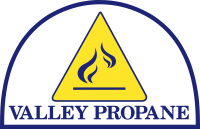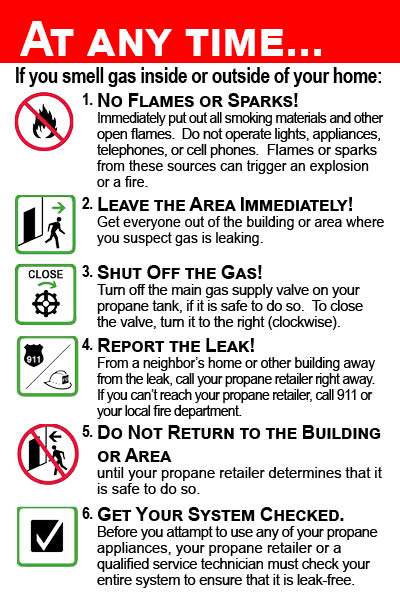Follow these before, during, and after instructions to keep your family safe in the event of an earthquake.
During an earthquake, there are non-propane-related safety measures that you should know. Whether you are inside or outside of your home, you must quickly decide on the best course of action to take:
After the earthquake is over, you are not necessarily out of danger. Often, an earthquake is followed by aftershocks where additional trembling can be felt. These can occur shortly after the initial earthquake has occurred or even several days later. Listen to your local authorities, or television and radio stations, for instructions on the appropriate course of action to take. Use caution in the area surrounding your home or farm. If you have any doubts about your safety, leave the area immediately and have your property inspected by a qualified building inspector or structural engineer before re-entering. Take the time to carefully evaluate the condition of all the structures on your property. If it is dark, use flashlights, not candles. Look carefully around the entire area. Check for downed power lines. Those can create major safety hazards. Earthquakes can move, shift, or damage gas lines and tanks. Immediately call your local utility company or propane retailer if any of these hazards exist. Follow these General Safety Rules
Sometimes, as a result of an earthquake, a power outage, fire, or flood can occur. To help reduce the potential for injury or death, there are general safety rules you should observe at all times.
Be Prepared For An Earthquake Before It Happens:
- Know how and where to shut off the outdoor propane supply and indoor propane appliances.
- MAKE SURE THAT YOU AND YOUR FAMILY KNOW WHAT PROPANE SMELLS LIKE. Propane has a strong, unpleasant smell like rotten eggs, a skunk’s spray, or a dead animal.
- Consider anchoring or bracing your tank to help prevent it from moving, sliding, or falling over during an earthquake.
- Clear the area of any tall or heavy objects that can fall on the tank during an earthquake.
- Consider installing a seismic gas shutoff valve. This type of valve will automatically cut off the flow of gas to your home during an earthquake. Some areas may require the installation of a seismic gas shutoff valve. Contact your local authorities or propane retailer for more information.
- NEVER store or place a propane cylinder indoors or in an enclosed area such as a basement, garage, shed, or tent. It is recommended that you consider installing a carbon monoxide (CO) detector listed by Underwriters Laboratories (UL) on every level of your home. Be sure to follow the manufacturer’s instructions regarding installation, location, and maintenance.
- Propane gas detectors provide an additional measure of security. It is recommended that you consider installing one or more propane gas detectors listed by UL. Be sure to follow the manufacturer’s instructions regarding installation, location, and maintenance.
- Have a list of instructions on how to turn off electricity, propane, and water. Review suggested preparations for natural disasters such as earthquakes with your propane retailer as well as other utility suppliers. Advise them of any special needs you may have.
- Create an emergency preparedness plan and review it regularly with your family in order to keep them safe during a potential disaster.
During an earthquake, there are non-propane-related safety measures that you should know. Whether you are inside or outside of your home, you must quickly decide on the best course of action to take:
- If you are inside a building and you feel the earth shaking, immediately get down on the floor and take cover under a sturdy stationary object such as a heavy table, counter, or a desk. Protect your head and face, while holding onto the object, until the trembling stops.
- If you are outside, make sure that you stay clear of buildings, trees, power lines, propane tanks, or other large stationary objects that could collapse during a large tremor. Drop downon the ground and protect your head and face.
After the earthquake is over, you are not necessarily out of danger. Often, an earthquake is followed by aftershocks where additional trembling can be felt. These can occur shortly after the initial earthquake has occurred or even several days later. Listen to your local authorities, or television and radio stations, for instructions on the appropriate course of action to take. Use caution in the area surrounding your home or farm. If you have any doubts about your safety, leave the area immediately and have your property inspected by a qualified building inspector or structural engineer before re-entering. Take the time to carefully evaluate the condition of all the structures on your property. If it is dark, use flashlights, not candles. Look carefully around the entire area. Check for downed power lines. Those can create major safety hazards. Earthquakes can move, shift, or damage gas lines and tanks. Immediately call your local utility company or propane retailer if any of these hazards exist. Follow these General Safety Rules
Sometimes, as a result of an earthquake, a power outage, fire, or flood can occur. To help reduce the potential for injury or death, there are general safety rules you should observe at all times.
- NEVER use outdoor propane appliances indoors or in enclosed areas. This can result in CO poisoning or death. These include
outdoor portable heaters, barbecue grills, and portable generators. Only use appliances indoors that are designed and approved for indoor use. - NEVER store or place a propane cylinder indoors or in an enclosed area such as a basement, garage, shed, or tent.
- NEVER use a gas oven or range-top burners to provide space heating.
- DO NOT UNDER ANY CIRCUMSTANCES TRY TO MODIFY OR REPAIR VALVES, REGULATORS, OR OTHER APPLIANCE PARTS.
- NEVER turn on a light switch, use any power source, or inspect your household appliances while standing in water. This can result in electrocution.
- DO inspect chimneys, flue pipes, and vent connectors for damage, blockage, or debris.
- DO inspect your propane appliances for water or other damage, if it is safe to do so. If the appliances have electric components and have been exposed to water, they can create a fire hazard.
If you suspect any of your propane appliances, equipment, or vehicles have been under water or they have been damaged, or you
have turned off your gas supply:
- DO schedule a time for a qualified service technician to perform a complete inspection of your propane system. The technician can also perform a leak test on the system and re-light your pilot lights.
- Do not use or operate appliances, equipment, or vehicles, or turn on the gas supply, until your system has been inspected by a qualified service technician.

